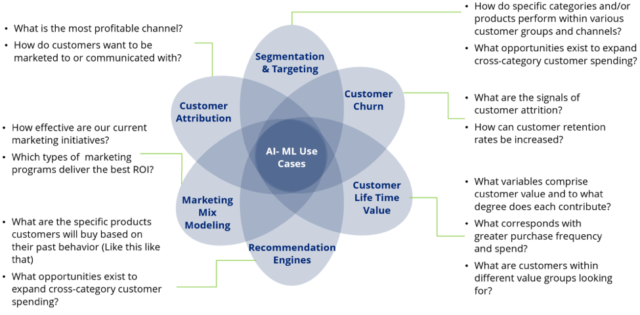The Increasing Role of AI-ML in Marketing
By: Dr. Evi Rinawati Simanjuntak, M.M.
Technologies have been integrated into businesses to help them achieve more results in terms of user experience, customer satisfaction and customer engagements. Some of the growing application of technology in businesses is artificial intelligence (AI) and one of it’s branch: machine learning (ML). While the two are usually used interchangeably, they are actually different. AI is the umbrella idea that machines and computers can complete tasks normally requiring human intelligence. ML is a branch of AI, in which the machine (computer system) can learn from the data it analyzes by identifying patterns. Ultimately, this technology can make decisions without humans, therefore a broad application of ML is for decision support system.
Artificial intelligence or AI is known to deliver increased business value as they help in decision making, strategic intelligence and customer relationship management. AI can increase customer engagement as it can support customer’s buying process.
Chatbots is a form of artificial intelligence which is acting as an automated assistant which communicates directly to customers through chatting platform. Chatbots may respond to questions ranging from simple to complex questions, depends on the embedded machine learning algorithm in the machine. Currently, chatbots are not in a level where they can communicate extensively with its users. Even so, users still enjoy engaging with it since it could be used in different ways; e.g. Siri engages with users by cracking up jokes (Portela and Granell-Canut, 2017). Once again, common problem of using chatbots is that users are not aware of this technology and lack of personal touch.

Marketers can use machine learning to monitor customer behavior. ML algorithms can be used to many cases as can be seen in Figure 1. To the most sophisticated application, AI can be used to do hyper-personalization and rapid experimentation i.e. to create business scenarios and do the simulation to find insights and recommendation that is the most optimum one. The drawback of AI application to the present day is still the initial capital expenses and maintenance fee that is relatively higher compared to the traditional method. In addition to that, firms will also need additional time to implement and there is a chance that customers are facing higher technological complexity that may create negative reaction to the shopping experience.
Dr. Evi Rinawati Simanjuntak is currently a Subject Content Coordinator and Faculty Member in Business Management and Marketing Program at Binus Business School International Undergraduate Program. Further about her profile can be found here.
(Students in Business Management and Marketing – International Undergraduate Program will learn relevant topics on digital analytics under the course: Comtemporary Issue in Marketing. Visit our Business Management and Marketing curriculum to know more.)
Reference:
Portela, M., & Granell-Canut, C. (2017). A new friend in our smartphone? Observing Interactions with Chatbots in the search of emotional engagement. Proceedings of the XVIII International Conference on Human Computer Interaction, 48.



Comments :